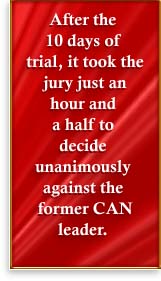


hen the jury announced its verdict in a civil case in Chicago on July 3, it was a victory for both freedom of religion and freedom of expression, marking an end to nearly a quarter-century of harassment and lies. And, according to experts on religious affairs, it may also have helped draw the final curtain on deprogramming—a practice the late Rev. Dean Kelley of the National Council of Churches condemned as “the most serious stain on religious liberty facing this country in the latter half of the 20th century.”
All of this came the day before Independence Day, when the Church of Scientology International won a unanimous jury verdict in a case brought by the former executive director of the old Cult Awareness Network (CAN)—the primary mouthpiece and platform for criminal deprogrammers. “This decision puts an end to the final death throes for the old CAN and its leadership,” said Rev. Heber Jentzsch, president of the Church of Scientology International. “And it sends a signal to those who would rather see freedom of speech squelched than have their skeletons out in the open, who would rather obstruct than reform when abuses exist.”
The old CAN was notorious and its reputation well-deserved: its founder a kidnapper and multiple felon charged with an array of offenses including rape and cocaine possession; its favored “deprogrammer” a convicted jewel thief and reported psychopath; its security chief a longtime inmate of some of America’s toughest jails.
The “original deprogrammer,” Ted Patrick, defined the old CAN’s central practice as “kidnapping at the very least, quite often assault and battery, almost invariably conspiracy to commit a crime and illegal restraint.” Over the last quarter-century, deprogrammings were aimed at virtually all faiths.
The group falsely portrayed its work as “educational” to both the U.S. government and the American public, while serving as an outlet for hysteria and reportedly receiving kickbacks from its network of deprogrammers in exchange for referrals.
Thus the old CAN was a fitting candidate for exposure and reform. In 1990, Freedom, in one of a series of articles it published over the course of a decade, unmasked the criminal past of Michael Rokos, then president of CAN, who had covered up his arrest for soliciting a young Baltimore police officer posing as an underage male prostitute, to perform obscene sexual acts. The exposures led to his resignation.
But surrounded by court losses and mounting problems with the law entangling the old CAN’s deprogrammers, the group’s last executive director, Cynthia Kisser, desperately sought a means to save face and control the damage. She filed a lawsuit in 1992 charging Freedom had defamed her when it published the truth: that she had associated with and supported the criminals who were the essence of her organization.
 Five years later, in June 1997, the case came before a 10-member federal jury. The panel heard witnesses called by Kisser and her lawyers testify to how the old CAN assisted a collection of anti-religious outlaws and other unsavory characters.
Five years later, in June 1997, the case came before a 10-member federal jury. The panel heard witnesses called by Kisser and her lawyers testify to how the old CAN assisted a collection of anti-religious outlaws and other unsavory characters.
Piece by piece, the old CAN’s criminality and hypocrisy emerged in a clear and undeniable pattern. With document after document, witness after witness—ironically, those called by Kisser’s own counsel—a history of intolerance, violence and crime filled the record.
Kisser’s own words and actions repeatedly came back to haunt her. In trial testimony, jurors heard how she had told the Cleveland Plain Dealer that if Jesus Christ were alive today, she would have him investigated by the old CAN and their findings shared with the media. They also learned how she had endorsed violent deprogrammer and convicted felon Rick Ross as “among the half-dozen best deprogrammers in the country.”
After the 10 days of trial, it took the jury just an hour and a half to decide unanimously against the former CAN leader. The jury found no basis for Kisser’s claims and, in remarks to attorneys after the verdict, noted that they found Freedom’s information to be well-documented, voluminous and correct.
“This case made it clear that [Kisser and the old CAN] had been involved in coercive tactics and had been denying it,” said religious scholar Dr. David Bromley of Virginia Commonwealth University, noting that the group should have disavowed its tactics of violence and that its failure to do so had ultimately been its undoing.
Dr. Anson Shupe, professor of sociology at the University of Indiana who specializes in the study of religious movements, characterized the lawsuit as “a last-gasp effort” and a failed attempt at revenge by the old CAN. “If you’ve had a fraud and a pervert as your president,” Shupe said, “what else can you say?”
“This was the ultimate blow to the hatred embodied by the former CAN,” said attorney Kendrick Moxon after the verdict. “It was an attempt to stave off the inevitable—the close to the sad saga of the old CAN. Now all people of America can practice their religion without the terror inspired by deprogramming or its practitioners. And those who wish to expose any similar abuses can—and should—feel free to do 

